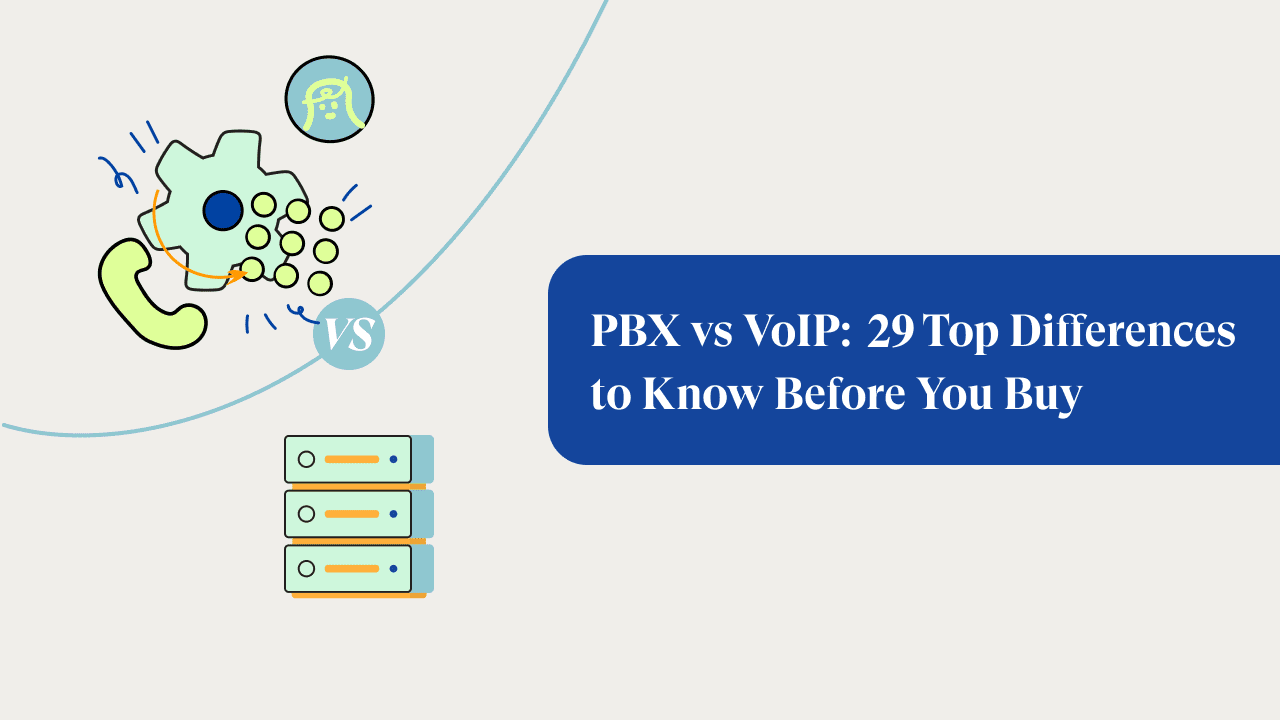Confused about which phone system to choose for your business?
Back to the common PBX vs VoIP discussion?
In this blog, we discuss what is PBX and VoIP and how they are different. In the process, you’ll also get your answer to which one is better – PBX or VoIP.
What is Private Branch Exchange (PBX)
A Private Branch Exchange System (PBX) refers to a private telephone network that manages all incoming and outgoing calls within a company. This system typically relies on copper-wired landlines for communication. There are telephone switches in the PBX box, which allow calls to be diverted or “switched” to other desk phones throughout the firm.
What is VoIP (Voice Over Internet Protocol)?
VoIP is a type of PBX. However, when one refers to “PBX” they are usually referring to the classic model of PBX, which used telephone lines. VoIP is a more advanced form of private communication within an organization.
VoIP stands for Voice Over Internet Protocol. The essential feature of VoIP, as the name suggests, is that it uses digital signals via the internet for communication.
Recommended Read: All You Need to Know About VoIP Phone Systems: A Complete Guide
PBX vs VoIP: 29 Differences to Know Before You Buy One
Going by the definitions of both, we know that the fundamental difference between PBX and VoIP is the use of telephones vs. the use of the internet to make calls.
But this fundamental difference is what makes way for the multitudes of differences between VoIP and PBX. To understand both systems, it is essential to examine all of the detailed distinctions between the two.
Listed below are the top 29 differences between PBX and VoIP:
1. Introductory Cost
Setting up a PBX system for your business is expensive. A power source, modems, suitable telephone sets, and headgear must be acquired in advance. The expenditures of establishing and configuring the entire infrastructure are also hefty.
Voice over internet protocol (VoIP) solution is less expensive. There’s no need to set up an entirely new system if you already have internet access. You only need to invest in a modem capable of handling elevated calls, appropriate network equipment, and workstation call applications.
2. Operating expenses
Setting up a PBX system for your business is expensive. A power source, modems, suitable telephone sets, and headgear must be acquired in advance.
The expenditures of establishing and configuring the entire infrastructure are also hefty.
However, utilizing Voice over internet protocol (VoIP) solution is less expensive. There’s no need to set up an entirely new system if you already have internet access.
You only need to invest in a modem capable of handling elevated calls, appropriate network equipment, and workstation call applications.
3. Clarity of connections
The connection clarity of a PBX is mostly determined by the infrastructure, which encompasses modems and phone variants. The calls will be of good quality if the system is properly configured and consists of top-quality devices.
The situation is somewhat more convoluted with VoIP. A variety of factors can cause weak audio quality. A slow or unsteady internet connection is one of the most typical causes. Calls may lag and snags may occur if the network isn’t set up properly.
4. Scalability
With VoIP, a service centre’s equipment can be extended quickly. You may, however, need to modify your high-speed internet subscription or install a wireless router to achieve higher scalability.
It’s not as simple with PBX. As all telephone lines are physically connected to the PBX system’s Key Service Unit (KSU), you’ll need to frequently add and maintain multiple telephone lines and sound gear.
5. Endurance
A PBX platform is highly secure and robust if installed correctly. There is little chance of cyberattacks invading. This is why the only issue is component failure.
On the other hand, VoIP communication is online and vulnerable to hackers.
While VoIP companies strive to make their equipment as secure as possible, the ability to detect malware or intrusion activities depends on your organization’s security standards and protocols.
It’s a requirement to use call security, secure credentials, and a robust barrier.
6. Agility
You can make calls from your computer or smartphone using VoIP. Calls can be handled by customer support and sales agents even outside the workplace.
To link their devices, PBX relies on on-premise equipment and platforms use their own data service. Outside the workplace, you can’t use the private devices and equipment that are part of PBX.
7. Software that adheres to industry norms
A custom-built PBX panel is frequently built without regard for industry norms. It may only work with a restricted series of interconnected devices and handsets. Hence, it is inflexible.
Contemporary VoIP technologies allow you to use the most up-to-date modems, handsets, headsets, and other equipment.
This increased flexibility makes it easier for companies to adapt to big changes. For example, VoIP services can easily be used even when employees work from home.
8. Cybersecurity
VoIP functions on the internet. Therefore, there is always the issue of cybersecurity that arises with it. This is tackled by taking security measures such as adding firewalls to one’s server. However, the level of security is determined by the budget and resources of your service provider.
With PBX, there is no chance of cyber tampering because the device is simply not hooked up to the internet, as it functions offline on PSTN.
9. Domestic calls
Calling charges used to be a big issue before VoIP. Various calls, irrespective of distance, are treated the same by VoIP companies because they are done over the internet.
Companies using a landline PBX may incur long-distance or duration rates depending on their plan. Not many PBX service providers have the facility of unlimited calling without considering the distance.
10. International calls
Telephone lines can be quite expensive to connect overseas. For foreign telephone calls, phone providers charge exorbitant minute charges that are not affordable in the long run.
You must pay conventional phone network charges if your PBX includes a fixed-line.
VoIP rates are much more affordable in this sense. International calls are typically charged at only a slightly higher if not the same rate for domestic calls by VoIP services.
Therefore, long-distance communication is more convenient and affordable.
11. Power cuts
While analogue telephone lines don’t typically need electricity, PBX systems do. PBX systems rely on their connection via the KSU, which is power plugged.
VoIP relies on power too. It needs the router and modem connected to a power source. Therefore, in terms of power outages, PBX and VoIP are at the same level.
However, some service providers extend VoIP services to smartphones. In such a case, you can access VoIP through your phone. Selecting a good service provider may be the solution here.
12. Functions for enhanced voice message
Voicemail features are essential for the customer service of any business. With VoIP, it is pretty convenient to add voicemail features. All you have to do is add it to your plan with your vendor.
On the other hand, traditional PBX would require additional hardware installation to add a voice note feature. This can be more of a hassle.
13. Alternatives in vendors
On-premise PBX systems are becoming increasingly rare. When it comes to VoIP, there are a lot of options for you to choose from. VoIP is modern technology, which is why it is continuously expanding and growing. The majority of phone carriers and mobile operators have entered the VoIP market.
Therefore, even if you choose to have an on-premise PBX, chances are that the maintenance and repair problems may continue to become causes of concern. There is a lower number of service providers.
14. Connecting via digital signals
A traditional PBX system can only handle audio. This entails receiving and making calls, forwarding calls, and adding voicemail.
Unlike PBX, VoIP can be connected to smartphones, laptops, and tablets in addition to telephones. Therefore, messages, emails, texting, and video calls are all doable with VoIP. This allows you to communicate on various platforms and thereby increases accessibility.
15. Agreements and obligations
With on-site PBX systems, the standard is to have long-term contracts. Therefore, if you get a PBX service, you may have to commit to it for a longer term.
On the other hand, VoIP services have both short-term and long-term plans. They are easier to try out and more flexible. As a result, VoIP systems are easier to experiment and explore with.
16. Using the World Wide Web
Conventional PBX interconnection is an outdated system. It’s generally built on a distinct network from your local area network, and maintaining it can be sluggish and expensive.
VoIP, on the other hand, can link to your existing communications infrastructure via the world wide web. It is the more progressive and era-appropriate service to use.
17. Alternatives for devices
A typical PBX needs a lot of equipment. This includes a functioning KSU, telephones for each desk, sound equipment, and so on, as its functioning relies on these devices.
You have sufficient alternatives with VoIP systems, as components can be added or removed whenever one desires without big complications.
18. Alternatives for modification
Modifying PBX setups is possible, but it’s a time-consuming process requiring new gear and expert assistance.
You can easily customize your VoIP plan to achieve the capabilities you require without changing your technology.
19. Performance in the workplace
Changing a PBX network, like adding features or modifying them, can be very complex. You’ll need new devices and a professional. It is time-consuming and can interrupt the regular productivity of the employees.
With VoIP, performance remains relatively unaffected by new modifications. They can be added without interrupting other work. Your personnel can continue performing without any disruptions.
20. Service delivery mechanisms
PBX networks necessitate the presence of a full-time IT specialist on-site to manage the requisite physical equipment.
A VoIP system simply requires internet access to make and receive calls, using less equipment. It won’t need to bother your IT department too much.
21. Compatibility with smartphones
A conventional PBX cannot be used with a cell phone. Its functioning relies on telephone cords.
VoIP services are especially popular and preferred because they can be accessed on one’s smartphone. It can work on both iOS and Android phones.
22. Accessorizing and employee convenience
Adding extra tools and accessories to your system is simple with VoIP. Cutting-edge VoIP headsets can be useful for support professionals who work with customers.
Accessorizing is not that simple with traditional PBX. You would have to use your telephone handset, which is slightly inconvenient to work with every day.
23. Company size
PBX devices are reliant on telephone lines. The size of the company is therefore always a concern because each desk must have its telephone connected to the KSU. Therefore, the number of lines in PBX is limited.
It is much easier to accommodate an expanding company size with VoIP. There is no component of physically adding telephone lines to the main line.
24. Suitability
Both PBX and VoIP may be suitable for different businesses according to their goals, resources, budgets, and expansion plans.
Companies that aren’t planning to expand in the future may be better suited to stick with their original PBX.
However, if a business is large and distributed in branches, VoIP is more economical and practical.
One common plan can be implemented across offices. The communication can be expanded and extended to the entire company and not just one office.
25. Tech management
If you have a PBX installed, you will need an efficient IT team to be available for round-the-clock maintenance. You will be responsible for handling malfunctions because you own them.
VoIP is not as complex and hardware-oriented as PBX.
Even if your business doesn’t have a big fancy IT department you will be able to manage it. PBX is not for you if your company doesn’t have an IT manager.
26. Technical advancements
VoIP is an upcoming and growing private communication method.
Many additional features, such as call monitoring and reporting, ring sets, conversation waits, voicemail notifications, and teleconferences, have been added since people began using it.
These features are absent in traditional PBX systems. Even with modifications, telephones can unfortunately only go so far.
27. Collaboration
VoIP allows you to collaborate privately with other team members in the company, but PBX cannot. VoIP has the feature of creating team chats that can be created to work on current projects within the company. It can also easily collaborate with other offices within the company.
PBX is largely an internal communication system that is limited to its on-premise telephone lines. There is not much scope for getting subdivided into groups and communicating with specialized teams effectively.
28. Android/iOS apps
Many VoIP service providers give you the option to connect your VoIP to an application on your mobile phone. This makes your communication system very independent. Even in cases of power outages, you can access this app and connect it to the internet via mobile data.
Since PBX is not connected to the internet, it is not accessible in case of a malfunction or power outage that turns off the KSU. Your work will halt until the issue is physically fixed.
29. Accessibility across devices
A commendable feature of VoIP is that you can easily use the same contact number across your devices. You are less reliant on traditional telephones and can easily be reached from anywhere via laptop, smartphone, or telephone.
Since PBX consists of interconnected telephone lines, this is not possible with it.
Start your 14 day Free Trial Your Quickest PBX Replacement Is Here! Set Up JustCall In Minutes.
PBX vs VoIP Cost & Advanced Features Comparison
Basic PBX plans start from $20 in the market. Basic PBX plans will provide you with several options, like call forwarding and routing. PBX system price will depend on its type.
Usually, the running costs of a virtual PBX are less than a standard PBX. As compared to a PBX system, the VoIP cost is less. Even landline costs are greater than VoIP costs for organisations.
In VoIP vs PBX cost comparison, PBX is more expensive. VoIP phone costs have also decreased a little in the past few years.
A few years back, PBX offered several advanced features like auto attendant, call analytics, audio/video conferencing, call queuing, call encryption, and more. Over the years, VoIP providers also came up with advanced features for organizations.
At present, VoIP’s advanced features include remote call recording, ring groups, call forwarding, and more.
A VoIP system will include the features of the best PBX system for small businesses. With fewer VoIP phone prices, companies can successfully reduce expenses.
Conclusion
Both PBX and VoIP have their own set of benefits and drawbacks. PBX is dependable and secure, but it is expensive to set up, operate, and maintain.
On the other hand, VoIP is extremely adaptable and versatile, and the cost to maintain the infrastructure is lesser than with landlines. However, VoIP performance relies heavily on internet access abilities; so you would need high-speed internet.












